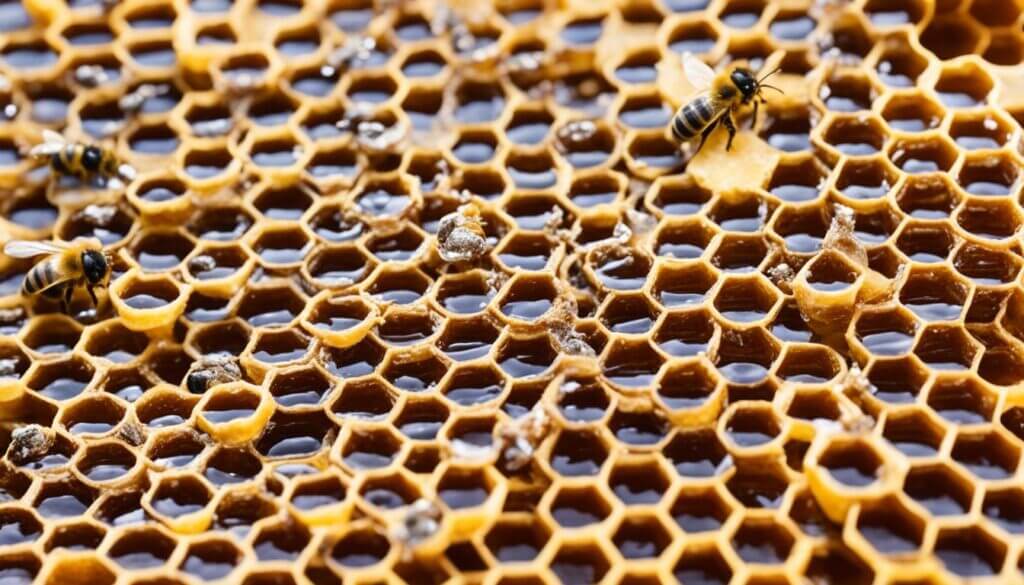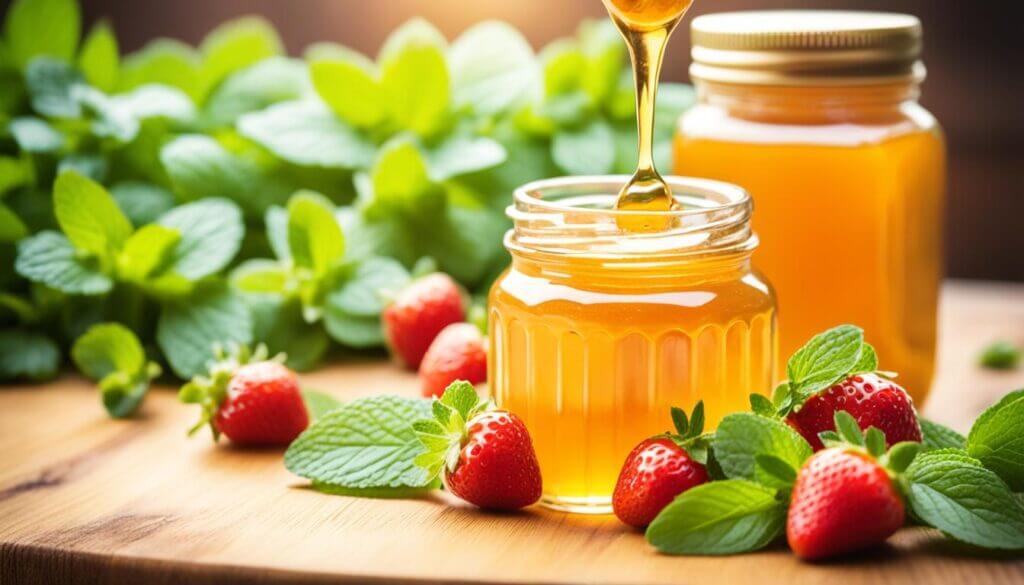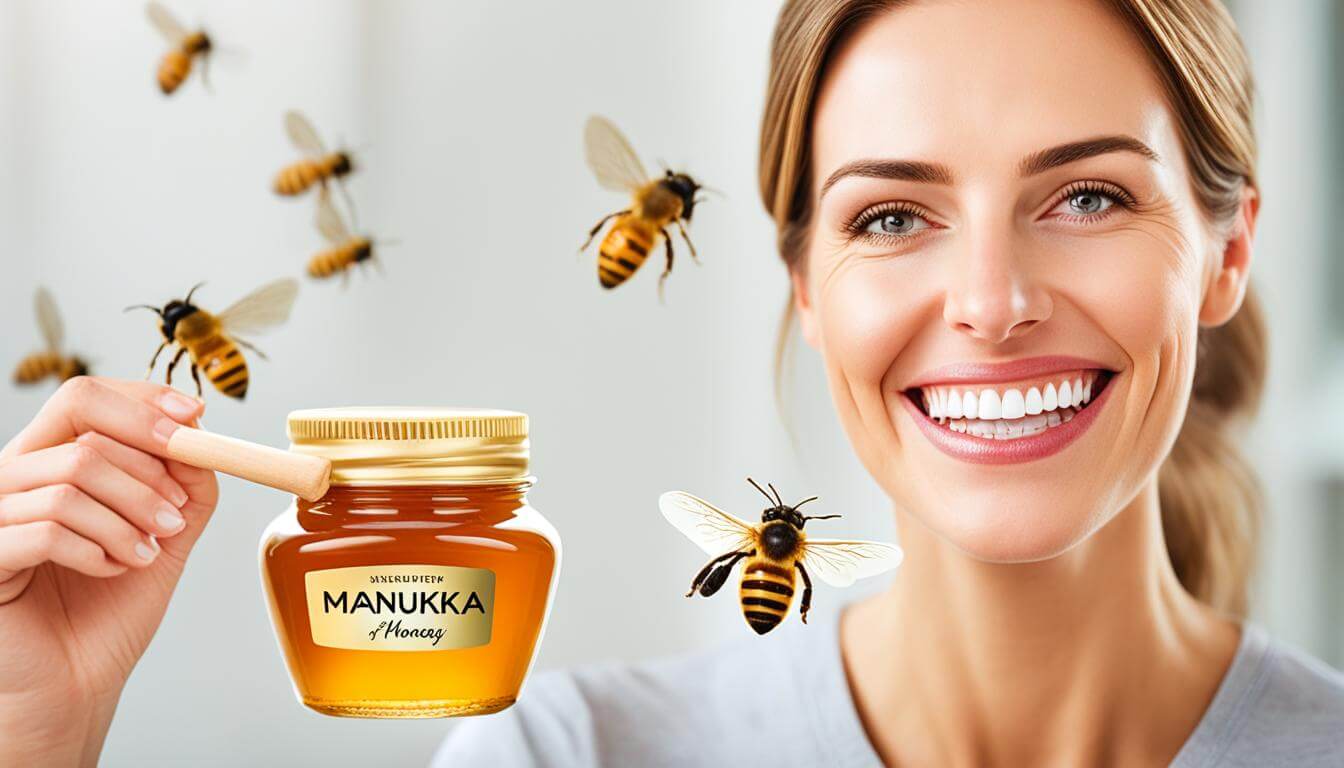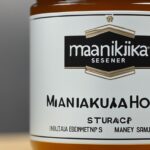Amidst the plethora of natural dental remedies that promise oral health benefits, one sweet substance stands out – not just for its taste, but for its surprising role in oral care. Manuka honey, revered as a natural elixir, prompts us to rethink traditional dental health practices. But how exactly can this sticky nectar be a boon for your teeth and gums? Explore the Manuka honey uses that dentists and natural health advocates are buzzing about, and discover a holistic approach to maintaining a gleaming, healthy mouth.
Sourced from the nectar of the Manuka bush, this honey variant has stepped out of the shadows of alternative medicine into the spotlight of dental health innovation. Join us as we decode the unique properties of Manuka honey that could turn your oral care routine on its head, offering advantages that extend beyond the kitchen cabinet and into your daily oral hygiene ritual.
Natural Antibacterial Properties of Manuka Honey
Renowned for its exceptional antibacterial properties, Manuka honey has proven to be significantly more potent than traditional honeys. A core component, methylglyoxal (MGO), imbues Manuka honey with its powerful antibacterial qualities, setting a new standard in natural antiseptics. The efficacy of Manuka honey extends even to tackling formidable bacteria such as Methicillin-resistant Staphylococcus aureus (MRSA), presenting a promising natural alternative in the fight against antibiotic-resistant strains.
Research underscores the remarkable capabilities of Manuka honey as an antibacterial agent. A cornerstone of its prowess lies in its high MGO concentration, which is derived from the conversion of another compound, dihydroxyacetone, found abundantly in the nectar of Manuka flowers. The distinctive MGO content is what grants Manuka honey its exceptional status as an antibacterial honey. It’s not merely the MGO alone but a symphony of other compounds present that contribute to the honey’s full antibacterial potential.
| Compound | Characteristic | Role in Antimicrobial Activity |
|---|---|---|
| Methylglyoxal (MGO) | Primary active ingredient | Directly attacks bacteria, disrupting growth |
| Hydrogen Peroxide | Byproduct of enzyme activity | Antiseptic quality aids in disinfection |
| Low pH level | Acidic environment | Inhibits the survival of harmful bacteria |
Investigations into the impact of Manuka honey on oral health reveal its potential in preempting infections, soothing inflammations, and fostering a bacteria-resilient environment in the mouth. Its multifaceted approach in targeting bacteria accounts for its rise as a favored natural antiseptic among health enthusiasts and practitioners alike. The pursuit of alternative, antibiotic-sparing solutions has been invigorated by Manuka honey’s promise in this era of rising antibiotic resistance.
While the journey of Manuka honey from the flower to the jar is a tale of nature’s finesse, it is its journey through scientific validation that has truly cemented its status in medical and health circles. Whether as a topical application or an adjunct to oral hygiene practices, Manuka honey’s antibacterial qualities shine through, offering a natural and effective option for maintaining optimal health, without the potential side effects typically associated with synthetic antibiotics.
Manuka Honey Dental Health: Boosting Oral Hygiene
When it comes to improving dental hygiene, incorporating Manuka honey into your oral health routine can offer surprising benefits. This natural substance, renowned for its antimicrobial properties, can be a valuable addition to daily dental care. Below, we explore practical ways to harness the Manuka honey benefits effectively and safely for better oral hygiene.

- Use Manuka honey as a natural mouthwash by diluting it in water to help reduce bacterial buildup and refresh the mouth.
- Apply a small amount of Manuka honey directly to the gums and massage gently to promote gum health, leveraging its anti-inflammatory properties.
- For those with a sweet tooth, substitute sugars and syrups with Manuka honey to mitigate the risks of tooth decay and plaque formation.
Advisory tips from dental professionals suggest that these methods can be incorporated as adjuncts to an already solid oral care regime.
| Manuka Honey Application | Purpose | Usage Instructions |
|---|---|---|
| Natural Mouthwash | To reduce bacteria and freshen breath | Mix one tablespoon of honey in a cup of warm water, swish around the mouth for 30 seconds, then spit out. |
| Gum Massage | To soothe and promote healthy gums | Apply a small amount directly to the gums, massage gently for 1-2 minutes, then rinse. |
| Sugar Replacement | To decrease the likelihood of cavities and plaque | Use in place of sugary syrups or sweeteners in teas, yogurts, or on top of pancakes and oatmeal. |
Keep in mind that while Manuka honey is beneficial, it is important to maintain regular brushing and flossing in your oral health routine, as advised by dental health professionals. With its unique properties, Manuka honey can be a valuable ally in your quest to improve dental hygiene.
Effects of Manuka Honey on Gum Health
Optimal gum care is essential for maintaining a healthy mouth, and natural remedies for gingivitis are increasingly sought after for their efficacy and minimal side effects. Renowned for its healing properties, Manuka honey has emerged as a powerful ally in preventing gum diseases and promoting gum health. Through a combination of scientific studies and traditional use, Manuka honey has been shown to alleviate issues like gum inflammation and bleeding—common symptoms of gum diseases.

The natural antibacterial components within Manuka honey directly target the culprits of gum disease, offering a soothing, anti-inflammatory effect. By creating an environment unfavorable for harmful bacteria, Manuka honey not only helps to reduce existing inflammation but also aids in the prevention of further gum tissue damage.
- Antibacterial Activity: Manuka honey’s unique enzyme-produced substances like hydrogen peroxide provide antiseptic properties that promote clean and healthy gums.
- Anti-inflammatory Properties: The high sugar concentration in the honey exerts an osmotic effect that helps to decrease swelling and pain.
- Fostering Tissue Regeneration: Rich in antioxidants, Manuka honey enhances the repair and regeneration of damaged gum tissue.
Studies have shown that the regular application of Manuka honey to the gums can significantly reduce gum redness and bleeding, common markers of gingivitis. By incorporating Manuka honey into daily oral hygiene routines, individuals can enjoy these reparative and preventive benefits as part of their comprehensive approach to gum care.
Preventing Tooth Decay with Manuka Honey
The scourge of dental caries, more commonly known as tooth decay, is a concern for many, but there’s a sweet twist in the story of cavities prevention. Manuka honey, famed for its unique healing properties, is emerging as a tooth-friendly contender. Research points to its capacity to ward off the harmful bacteria that contribute to tooth decay. Let’s delve into the anti-cariogenic properties that make this natural product not just palatable, but beneficial for oral health.
In contrast to the high-sugar content of snacks and candies that typically promote dental caries, Manuka honey operates differently. Studies suggest that the particular bioactive compounds in Manuka honey have the ability to disrupt the growth of bacteria associated with the formation of cavities.
Take a look at how Manuka honey stands compared to traditional high-sugar products in regards to oral health:
| Aspect | Manuka Honey | High-Sugar Products |
|---|---|---|
| Impact on Bacteria | Inhibits harmful oral bacteria | Feeds harmful oral bacteria |
| Sugar Content | Natural sugars with medicinal properties | Processed sugars with no health benefits |
| Contribution to Oral Health | Potentially reduces risk of dental caries | Increases risk of dental caries |
It’s clear that Manuka honey comes with a promise – a sugary delight that can be enjoyed without the usual risks to your teeth. However, remember moderation is key; incorporating Manuka honey as part of a balanced diet and a rigorous oral care routine can help maintain that bright, healthy smile.

As you savor the soothing texture and the rich taste of Manuka honey, take comfort in understanding its role as an ally in cavities prevention. It’s the kind of sweetness that brings a smile, not only for its flavor but also for its dental health benefits.
Alleviating Gingivitis and Periodontal Disease
Dealing with gum disease, such as gingivitis and periodontitis, can be a difficult and discomforting experience. Yet, the journey towards periodontitis relief and better oral health may be sweetened with the use of Manuka honey. Recognized for centuries as a potent natural ingredient, burgeoning research now suggests Manuka honey may be an effective natural gingivitis treatment. Its unique properties offer a dual action: soothing the inflamed gums typical of gingivitis and attacking the bacteria that are often at the heart of periodontal disease.
Evidence highlighting the impact of Manuka honey on dental health continues to grow. Not only does it offer hope as a natural therapy, but it also aligns with the modern shift towards holistic health practices. Here, we delve into the studies that outline its significant benefits for those battling gingivitis and periodontitis.
| Periodontal Issue | Manuka Honey Benefit | Notes from Clinical Observations |
|---|---|---|
| Gingivitis Inflammation | Anti-inflammatory properties reduce gum swelling | Less gum tenderness reported by patients after regular topical application |
| Periodontitis Bacterial Infection | Antibacterial action fights key periodontal pathogens | Visible reduction in plaque accumulation and bleeding on probing |
| Gum Tissue Regeneration | Promotes healing of damaged gum tissues | Accelerated healing observed post-surgical intervention in periodontal pockets |
Manuka honey’s application is not limited to these therapeutic effects; its role in preventive oral health care is also paramount. As a natural product, it complements daily oral hygiene routines without introducing synthetic agents into the delicate environment of the oral cavity. While more extensive clinical trials are ongoing, the current anecdotal and preliminary data present Manuka honey as a promising adjunct in natural dental care.
- Recommended as a natural mouth rinse to decrease bacterial load
- Can be gently massaged onto the gums to soothe irritation
- Serving as a healthier sweetening alternative, potentially reducing the risk of cavities and tooth decay

Fighting Plaque Build-Up with Manuka Honey
The centuries-old quest for impeccable oral hygiene has found a sweet ally in Manuka honey, renowned not only for its rich flavor but also for its impressive antiplaque benefits. Dentistry experts are continuously exploring the impact of natural products on oral care, and Manuka honey has emerged as a potent weapon against the battle of dental plaque. The components of Manuka honey have shown considerable promise in plaque reduction and dental plaque control, making it an attractive addition to one’s dental care regimen.
Scientific research sheds light on how this unique honey from New Zealand is able to interfere with the growth of dental plaque-forming bacteria. Studies suggest that Manuka honey’s unique enzymatic composition can disturb biological processes crucial to the development and survival of plaque-producing microorganisms. As a result, regular use of Manuka honey could reduce the occurrence of plaque and even prevent it from gaining a stronghold on your teeth and gums.
Here’s a closer look at the specifics:
- Manuka honey possesses a high concentration of antibacterial agents, which are effective against pathogens found in dental plaque.
- Its low pH level creates an inhospitable environment for harmful bacteria, aiding in plaque control.
- Even as a sweet substance, Manuka honey does not promote tooth decay like other sugars due to its unique antibacterial properties.
| Benefit | Description | Impact on Dental Plaque |
|---|---|---|
| Antibacterial Activity | Manuka honey contains hydrogen peroxide and methylglyoxal which are potent antibacterial compounds. | Reduces the bacterial load that contributes to plaque formation. |
| Anti-Inflammatory Properties | Reduces inflammation in the gums that can arise from plaque accumulation. | Prevents gingival inflammation and supports overall gum health. |
| Osmotic Effect | High sugar concentration in Manuka honey draws moisture away from bacteria, hindering their growth. | Creates an unfavorable environment for plaque-promoting bacteria. |
While the appeal of this delightful nectar seems limitless, it’s important for dental enthusiasts to integrate its use thoughtfully within a well-rounded oral care routine. Including Manuka honey as a supplementary approach for plaque reduction can potentially enhance dental wellness while indulging in its savory sweetness – a truly novel method for maintaining a radiant smile.
Manuka Honey as a Remedy for Bad Breath
Halitosis, commonly known as bad breath, can be an embarrassing and persistent issue. Fortunately, nature provides an effective solution in the form of Manuka honey. Renowned for its unique antibacterial properties, Manuka honey is now being recognized as a natural cure for halitosis, offering a pleasant alternative to freshen breath without the use of harsh chemicals.
The primary cause of bad breath is often the accumulation of bacteria in the mouth, which can produce foul-smelling compounds. The distinctive composition of Manuka honey, which includes the compound methylglyoxal (MGO), has been shown to target these bacteria, thereby serving as one of the most promising oral malodor solutions found in nature.
Manuka honey can be integrated into daily oral care routines to achieve better breath control. Below is a breakdown of various uses and advantages:
- As a mouthwash: Diluting Manuka honey in warm water and using it to rinse the mouth can aid in reducing bacterial presence.
- Post-brushing apply: Applying a small amount of Manuka honey on gums after brushing to take benefit of its prolonged antibacterial effect.
- Breath freshening: A teaspoon of Manuka honey swallowed or dissolved in the mouth can help neutralize oral odors momentarily.
Complementing traditional dental care with Manuka honey not only addresses halitosis but also contributes to overall oral health. Its potential in both treating and preventing the causes of bad breath makes it a valuable addition for those seeking natural cures for halitosis and a way to freshen breath naturally.
| Method | Benefits | Usage Tips |
|---|---|---|
| Mouthwash | Reduces bacteria, freshens breath | Use once or twice a day, do not swallow |
| Gum application | Long-term antibacterial action | Apply after regular brushing |
| Breath freshener | Neutralizes odors quickly | Take as needed throughout the day |
Incorporating Manuka honey into one’s oral hygiene practices is not just beneficial for breath freshness but also supports a holistic approach to dental health. Remember to always select high-quality, genuine Manuka honey to ensure you reap the full benefits of this remarkable natural product.
The Soothing Effects of Manuka Honey on Mouth Ulcers
When it comes to treating canker sores, one natural remedy has garnered significant attention for its ability to offer mouth ulcer relief: Manuka honey. Recognized for its unique properties, Manuka honey stands as a gentle yet powerful aid in oral mucosal healing. Users of Manuka honey for canker sores report not just a reduction in pain and inflammation, but also an accelerated healing process.
Indeed, the application of this natural product is rooted in its anti-inflammatory and antibacterial qualities, making it an ideal complementary approach to traditional medical treatments. Below, we explore the aspects of Manuka honey that make it beneficial for those suffering from mouth ulcers.
- Antibacterial Action: Manuka honey combats the bacteria that may exacerbate ulcer severity and prolong healing.
- Soothing Sensation: Its viscosity provides a protective barrier, preventing irritation from food and drink.
- Natural Inflammation Reduction: Ingredients in Manuka honey are known to reduce swelling and discomfort.
- Healing Promoter: Evidence suggests that it stimulates tissue regeneration, speeding up the recovery process.
While research continues to unveil the full extent of Manuka honey’s health benefits, the feedback from users is overwhelmingly positive. They often regard it as a kitchen cabinet staple that not only enhances their wellness routine but also offers acute relief in instances of painful canker sores. As with any remedy, it is recommended to discuss its use with a healthcare professional, especially for those with underlying health conditions or allergies.
Conclusion
As we have explored throughout our comprehensive look at Manuka honey and its impact on dental health, it’s clear that this natural product offers a suite of benefits for those pursuing a holistic approach to oral care. Summing up our Manuka Honey dental care summary, we’ve seen the evidence supporting its antibacterial qualities, its role in fighting plaque, and its soothing influence on gum health and mouth ulcers. Moreover, its potential in preventing tooth decay further positions Manuka honey as an alluring alternative within the realm of oral health natural products.
In embracing natural dental solutions, Manuka honey stands out as a unique agent that’s easy to incorporate into daily routines for those aiming to augment their dental regimen. Yet, as we underscore the promise held by this natural wonder, we also champion the necessity to consult with dental health professionals before making any significant alterations to your oral health regimen. Working in tandem with your dentist or healthcare provider ensures that you’re suitably informed and can utilize Manuka honey in the most effective and safe manner.
Finally, the journey of discovering the full spectrum of Manuka honey’s benefits for our well-being is ongoing. Current research has illuminated just a fraction of its capabilities, prompting us to remain attentive to future studies that may unlock even more health advantages. By understanding and adopting evidence-based natural dental solutions, we open the door to not only enhancing our oral health but possibly our overall quality of life as well.




